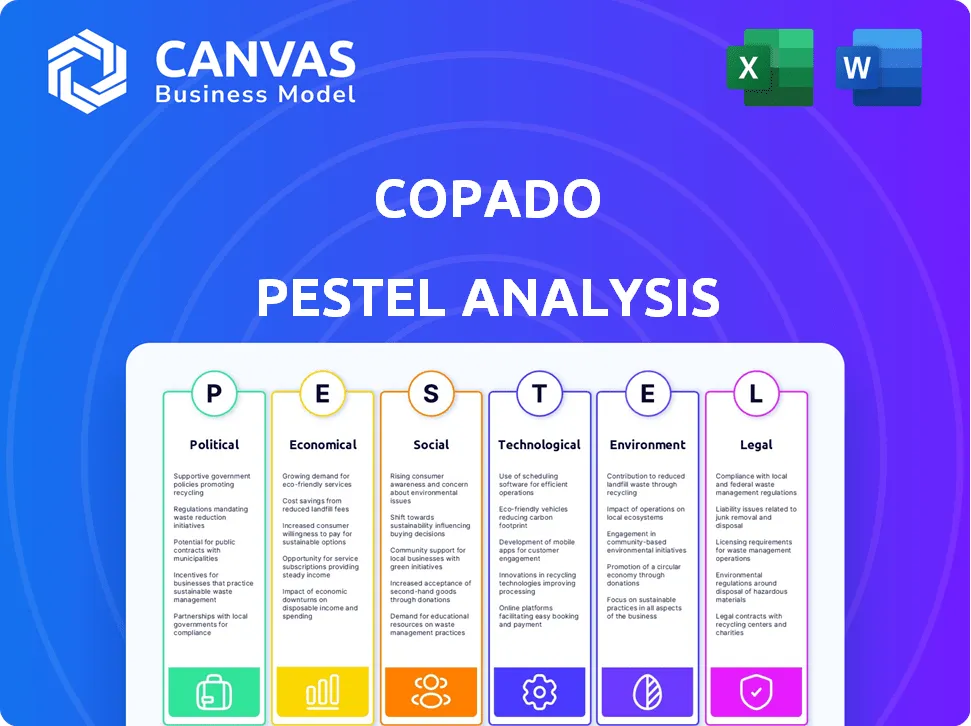In the vibrant landscape of enterprise technology, Chicago-based startup Copado is making waves, driven by a multitude of dynamic factors. This PESTLE analysis delves into the intricate web of political, economic, sociological, technological, legal, and environmental influences shaping the company’s trajectory. Discover how supportive local governance, a thriving venture capital scene, a tech-savvy workforce, and an evolving legal landscape converge to create opportunities and challenges in this fast-paced industry.
PESTLE Analysis: Political factors
Favorable government policies for tech startups
The U.S. government has implemented numerous policies aiming to bolster the tech startup ecosystem. As of 2022, the Small Business Administration (SBA) recorded a 5% increase in the allocation of loans to small businesses, which includes tech startups, totaling about $30 billion.
Supportive local governance in Chicago
Chicago's government has introduced several initiatives to support local startups. In 2021, the city launched the Chicago Venture Challenge, with a budget of $1 million specifically for local startups. Additionally, the Chicago Innovation Exchange reported that local startup funding reached $2.35 billion in 2021.
Relations with regulatory bodies affect compliance
Compliance costs can be significant for tech companies. According to a 2022 survey by the Compliance Week, around 20% of compliance budgets for tech startups in Chicago are spent on state and local compliance. For tech startups, this can translate to an average cost of approximately $250,000 annually per startup.
Federal funding for tech innovation initiatives
The federal government has committed substantial funding towards tech innovation. In FY 2023, the National Science Foundation (NSF) allocated $8.3 billion for research and development, with a significant portion directed toward tech startups engaging in innovative technologies. Furthermore, the Advanced Research Projects Agency-Energy (ARPA-E) announced $100 million in funding for energy tech companies in 2021.
Political stability encourages investment
The political landscape of the United States is characterized by relative stability, which has a favorable influence on investment levels. According to the World Bank, the U.S. attracted approximately $232 billion in foreign direct investment (FDI) in 2021, reinforcing the attractiveness of its political structure for investors.
| Factor | Data/Amount |
|---|---|
| Increase in SBA Loans for Tech Startups (2022) | $30 billion |
| Funding from Chicago Venture Challenge (2021) | $1 million |
| Local Startup Funding in Chicago (2021) | $2.35 billion |
| Average Annual Compliance Cost (2022) | $250,000 |
| NSF Funding for Tech Innovation (FY 2023) | $8.3 billion |
| ARPA-E Funding for Energy Tech (2021) | $100 million |
| Foreign Direct Investment in the U.S. (2021) | $232 billion |
[cbm_pestel_top]
PESTLE Analysis: Economic factors
Growing demand for enterprise tech solutions
The growth of enterprise tech solutions is notable, driven by the increasing need for digital transformation. In 2023, the global enterprise software market was valued at approximately $600 billion and is projected to grow to $1 trillion by 2030, representing a compound annual growth rate (CAGR) of around 8.7%.
Access to venture capital funding in Chicago
In 2022, the Chicago startup ecosystem raised about $2.4 billion in venture capital funding across various sectors, including enterprise technology. The average deal size in later-stage funding rounds reached $12 million, illustrating robust investor interest in tech-driven enterprises.
In the first half of 2023 alone, Chicago-based startups secured over $1 billion in venture capital, indicating a resilient funding environment even amid economic uncertainty.
Competitive salary demands for tech talent
The demand for tech talent in Chicago has led to a competitive job market, with average salaries for software engineers reaching approximately $115,000 per year in 2023. This is reflective of a larger trend nationwide, where tech salaries exceed the national average by about 25%.
Economic fluctuations impact spending on tech
Economic fluctuations significantly influence enterprise tech spending. In 2023, it was reported that global IT spending increased by 5.1%, reaching $4.5 trillion, but with projections indicating a slowdown to a 3.6% growth amid potential recessionary signals. Companies are becoming more cautious with tech investments, especially in uncertain economic times.
Presence of large corporations as potential clients
Chicago hosts several Fortune 500 companies, including Boeing, Walgreens Boots Alliance, and Exelon Corporation. Collectively, these corporations have substantial budgets for technology spending. For instance, Boeing reported an IT spending of over $1.5 billion in 2023. This creates a significant potential market for startups like Copado that provide enterprise tech solutions.
| Area of Impact | Value/Statistic | Source |
|---|---|---|
| Global enterprise software market (2023) | $600 billion | Statista |
| Projected market growth by 2030 | $1 trillion | Statista |
| Chicago venture capital funding (2022) | $2.4 billion | PitchBook |
| Average deal size (later-stage funding rounds) | $12 million | PitchBook |
| Average salary for software engineers (2023) | $115,000 | Glassdoor |
| Global IT spending increase (2023) | 5.1% | Gartner |
| Boeing IT spending (2023) | $1.5 billion | Boeing Annual Report |
PESTLE Analysis: Social factors
Sociological
The trend towards digital transformation is significant, with over 70% of companies globally in various sectors prioritizing digital initiatives. According to a McKinsey report, 92% of business leaders consider digital transformation core to their company's strategy.
Increasing focus on digital transformation in businesses
In 2021, approximately 85% of companies reported that digital transformation was a top priority for their board, indicating a necessary shift to remain competitive. Moreover, 60% of organizations will invest in software in tandem with embracing advanced technologies like AI and machine learning within their operational frameworks by 2023.
High level of tech adoption among enterprises
The enterprise tech sector has seen a rapid rise in technological adoption, with about 77% of enterprises utilizing cloud computing solutions and 70% implementing data analytics. Reports indicate that large enterprises are projected to spend around $1 trillion globally on digital transformation by the end of 2023.
Importance of diversity and inclusion in tech teams
Research indicates that companies with diverse teams are 35% more likely to outperform their competitors. A Deloitte study suggested that diverse companies have a 2.3 times higher cash flow per employee. In the tech industry specifically, women held only 26% of computing jobs as of 2020, underscoring a critical need for stronger diversity initiatives.
| Diversity Factor | Percentage | Impact on Performance |
|---|---|---|
| Women in Tech | 26% | 2.3x higher cash flow per employee |
| Companies with Diverse Leadership | 35% | Higher likelihood to outperform competitors |
Cultural shift towards remote and flexible work
The COVID-19 pandemic has accelerated the shift towards remote work, with 48% of employees reporting that they prefer a hybrid working model. A survey from Gartner found that 74% of CFOs expect some employees to continue working remotely indefinitely, significantly altering workplace dynamics.
Emphasis on work-life balance among workforce
A 2021 survey by FlexJobs revealed that 73% of professionals perceive work-life balance as a top priority when considering job opportunities. Another study highlighted that 89% of employees would prefer to work for organizations that prioritize mental health and wellness alongside flexible schedules.
| Work-Life Balance Factor | Percentage | Significance |
|---|---|---|
| Professionals prioritizing work-life balance | 73% | Influences job choice |
| Employees wanting mental health support | 89% | Attractiveness of company |
PESTLE Analysis: Technological factors
Rapid advancements in artificial intelligence
The enterprise tech sector is experiencing rapid advancements in artificial intelligence (AI). In 2023, the global AI market was valued at approximately $136.55 billion and is expected to grow to $1.81 trillion by 2030, reflecting a CAGR of 42.2% from 2022 to 2030. Companies like Copado are increasingly leveraging AI for enhancing DevOps processes, automating workflows, and facilitating predictive analytics.
Increasing integration of cloud computing solutions
Cloud computing is becoming an essential component of enterprise technology. The cloud services market in 2023 is projected to be valued at around $500 billion, growing at a CAGR of 19% from 2021 to 2028. Copado's platform is built to integrate seamlessly with leading cloud providers like AWS, Azure, and Google Cloud, providing businesses with scalable and flexible solutions.
Focus on cybersecurity measures for enterprise tech
As enterprises increasingly rely on technology, the focus on cybersecurity is paramount. In 2023, global spending on cybersecurity is expected to exceed $190 billion, increasing to an estimated $300 billion by 2026. In response to the rising number of data breaches, companies are investing heavily in zero trust architectures and automated threat detection systems.
Importance of data analytics for decision-making
The market for data analytics is rapidly expanding. In 2022, the analytics market was valued at approximately $23 billion, with projections to reach $77 billion by 2030. Data-driven decision-making is increasingly critical for organizations, and companies like Copado analyze large datasets to drive operational efficiency and improve software delivery metrics.
Growing trend of low-code/no-code development platforms
The low-code and no-code development platform market is experiencing accelerated growth. In 2023, the market is projected to reach a valuation of $26.9 billion, with a forecasted growth rate of 28.1% annually through 2030. This trend allows non-technical users to develop applications, contributing to faster deployment times and increased business agility.
| Technological Factor | 2023 Market Value | Expected 2030 Market Value | CAGR (%) |
|---|---|---|---|
| Artificial Intelligence | $136.55 billion | $1.81 trillion | 42.2% |
| Cloud Computing | $500 billion | Projected CAGR of 19% | N/A |
| Cybersecurity | $190 billion | $300 billion | N/A |
| Data Analytics | $23 billion | $77 billion | N/A |
| Low-Code/No-Code Platforms | $26.9 billion | N/A | 28.1% |
PESTLE Analysis: Legal factors
Compliance with data protection regulations (e.g., GDPR)
The General Data Protection Regulation (GDPR) imposes strict regulations on data handling for companies like Copado, particularly given their enterprise tech focus. As of 2023, companies that fail to comply with GDPR can face fines of up to €20 million or 4% of their annual global turnover, whichever is higher. Copado’s commitment to data protection includes establishing a process for General Data Protection Regulation compliance, particularly concerning customer data managed through its DevOps solutions.
Intellectual property rights impact on innovation
Intellectual property (IP) rights significantly affect Copado's ability to innovate and compete. In the United States, intellectual property protections, such as patents, provide a market competitive advantage. According to the United States Patent and Trademark Office (USPTO), in 2022, U.S. patents granted reached 400,000, promoting innovation across industries. Copado relies on its patented technologies to maintain its market position, having secured several patents in integration and deployment technologies.
Employment laws affect talent acquisition and retention
The landscape of employment laws in the U.S. directly influences business operations within Copado. The unemployment rate in Illinois as of September 2023 was 4.2% according to the Illinois Department of Employment Security. Changes in minimum wage laws also impact operations; Illinois's minimum wage is set to increase to $15 per hour by 2025. These factors necessitate competitive salary and benefits packages to attract and retain top talent in the tech industry.
Legal frameworks for software licensing and usage
Software licensing models greatly impact operational strategies within the enterprise tech sector. Per Licensing International, the software licensing market was valued at $147 billion in 2022 and is expected to reach $265 billion by 2026. Copado adheres to both open source and proprietary licensing frameworks to provide flexible solutions to its clients while ensuring compliance with respective laws governing these models.
| Licensing Type | Market Size (2022) | Projected Market Size (2026) | Annual Growth Rate |
|---|---|---|---|
| Open Source | $47 billion | $84 billion | 12% CAGR |
| Proprietary | $100 billion | $181 billion | 10% CAGR |
Ongoing changes in technology regulations
Technology regulations are rapidly evolving to address new challenges such as cybersecurity and digital privacy. The Federal Trade Commission (FTC) is increasing its scrutiny over data privacy practices. In 2023, the FTC proposed rules to regulate data collection and usage, with penalties for companies failing to adhere to enhanced privacy regulations potentially exceeding $50 million. Copado must stay ahead of these regulatory changes to minimize compliance risks.
PESTLE Analysis: Environmental factors
Commitment to sustainable business practices
Copado has committed to sustainability by adopting various practices aimed at reducing environmental impact. As of 2023, the company aims to achieve a 100% renewable energy target for all its global data centers by 2025. This commitment involves transitioning its energy sources to solar and wind energy, which has been projected to decrease its operational carbon emissions by approximately 30%.
Pressure to reduce carbon footprint in operations
The technology sector is under increasing pressure to minimize its carbon footprint. According to the Global Carbon Project, in 2022, the tech industry was responsible for approximately 2% of global carbon emissions, which equates to around 1.2 billion metric tons. In response, Copado has implemented strategies to measure and report its carbon emissions in alignment with the Science Based Targets initiative (SBTi).
Opportunities for tech solutions in environmental management
With the rise in environmental concerns, there is an emerging market for technology solutions aimed at environmental management. According to a report by Fortune Business Insights, the global market for environmental management technologies is expected to grow from approximately $1.12 trillion in 2021 to $1.66 trillion by 2028, at a CAGR of 5.7%. This growth presents opportunities for Copado to expand its services in environmental risk assessments and compliance management tools.
| Year | Market Size (in Trillions) | CAGR (%) |
|---|---|---|
| 2021 | 1.12 | |
| 2022 | ||
| 2023 | ||
| 2024 | ||
| 2025 | ||
| 2026 | ||
| 2027 | ||
| 2028 | 1.66 | 5.7 |
Community engagement initiatives for sustainability
In addition to corporate responsibility, Copado engages in community sustainability efforts. The company has partnered with local organizations in Chicago to launch tree-planting campaigns, aiming to plant 10,000 trees by 2025. This initiative supports urban biodiversity and aims to absorb roughly 1,400 metric tons of CO2 annually.
Influence of climate change on enterprise planning and strategy
As climate change continues to influence global business practices, Copado has integrated climate risk assessments into its strategic planning. According to a report from the World Economic Forum, 91% of business leaders believe that climate change will impact their operations within the next decade. Copado's planning incorporates adaptive measures to ensure resilience against climate-related disruptions, which are expected to rise by 20% over the next 50 years according to climate models.
In conclusion, Copado's position within the enterprise tech landscape of Chicago is shaped by a myriad of factors revealed in this PESTLE analysis. The interplay of political support, a dynamic economic environment, and shifting sociological trends underscores the startup's potential for growth and innovation. As technologies evolve rapidly, it is paramount for Copado to remain vigilant regarding legal compliance and adapt to evolving environmental expectations. By navigating these complexities effectively, the company can harness the opportunities that lie ahead.
[cbm_pestel_bottom]












